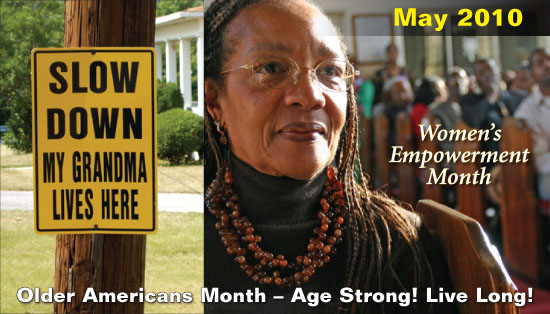Women Make the Difference

Women have became aware of their potential and their power. This month we recognize some of the groups and organizations responsible for this transformation.
Staff Reports
The YWCA’s motto is “Eliminating Racism, Empowering Women.” Its mission statement adds these words: “promoting peace, justice, dignity and freedom for all.” For more than half a century the organization has worked to accomplish those goals, most recently during the national Stand Against Racism when more than seventy Asheville-area nonprofits and businesses and thousands of residents participated as cities around the country stood up to oppose racial prejudice.
A History of
Woman-Led Activism
 |
| Photo © Anissa Thompson, www.anissat.com |
Like many other progressive movements in our history, the Stand Against Racism was originated and led by women. Since before the Civil War women have been in the forefront of the nation’s social and cultural change.
Historical figures abound: Mother Jones (labor activist) and Mary McLeod Bethune (cofounder, National Council of Negro Women); Sojourner Truth (anti-slavery and Civil Rights campaigner) and Harriet Tubman (escaped slave, abolitionist spy, and crusader for women’s rights); Ida B. Wells (journalist, cofounder NAACP, Civil Rights and anti-lynching crusader) and Margaret Sanger (birth control activist) were among the giants of the 19th and 20th centuries.
Here in Asheville, too, women led the fights for women’s suffrage, against segregation, and for equal civil rights for all, in both private business and public life. The Asheville YWCA was the first in the South, and second in the nation, to integrate. When the white Y was anticipating a building campaign, its leaders met with the president of the black Y to discuss merging as a way to share costs and benefits. The women quickly found common ground and within a short time built a new, joint facility open to people of all races.
The Y, the League,
and the AAUW
The Y’s leadership in combating racism was strongly supported by two other women’s organizations, the League of Women Voters (LWV) and the American Association of University Women (AAUW). Both were primarily white, but both early on encouraged African American women to join. The three groups had a great deal of overlapping membership, in part the result of World War II.
During the war hundreds of thousands of women became aware of their potential and their power. Women took jobs that had never been open to them before, and they not only did them, they did them well. After the war it was frustrating and depressing to many women to find that they were expected to fade back into traditional roles as though they’d never left them. So naturally enough, women who had excelled at highly skilled jobs, and who had earned advanced degrees, joined, founded, and led organizations like the YWCA, the League, and the AAUW.
The AAUW embraced African American members almost from its founding, and in Asheville such educators as Mrs. Harriet Haith and Mrs. Francine Delaney were actively involved. The LWV began formally supporting integration in the 1950s, and the Asheville chapter had black members by the early 1960s. The fact that the groups themselves were integrated enabled them to lead the movement for public integration.
The Sororities Stand Forth
Another powerful movement grew out of prewar and postwar opportunities for education for women, especially African Americans. With black colleges open to women in greater and greater numbers, such sororities as Alpha Kappa Alpha, Zeta Phi Beta, and Chi Eta Phi produced well-educated, visionary leaders.
The women’s service organizations Delta House and The Links offer opportunities for women to take leadership positions in the community through involvement in programs that benefit others. All these organizations have a long history in Asheville and a sterling track record of accomplishment.
Howard University in the nation’s capital is the home of two of these sororities. Alpha Kappa Alpha was founded in 1908 and incorporated five years later, and from its inception it broke barriers for African American women in areas where they had had little power or authority. With a membership comprising college-educated women of African, Caucasian, Asian, Native American, and Hispanic descent, the sorority’s 250,000 members work to improve social and economic conditions through community service programs.
Nationally AKA has created such programs as the Mississippi Health Clinic and influenced federal legislation by Congressional lobbying through the National Non-Partisan Lobby on Civil and Democratic Rights. The sorority works with communities through service initiatives and progressive programs relating to education, family, health, and business.
Zeta Phi Beta was founded by Howard students a dozen years after AKA. Its nonprofit National Educational Foundation awards scholarships and conducts community educational programs and activities. The sorority also partners with the March of Dimes in its Stork’s Nest Program, designed to encourage low-income women to seek prenatal care within the first trimester of pregnancy, thereby increasing the prevention of birth defects and infant mortality.
Since 1932 Chi Eta Phi Sorority, the national sorority of registered professional nurses and nursing students, has been guided by its motto “Service for Humanity.” In keeping with its nursing origins, its programs focus on health promotion/disease prevention, leadership development, mentoring, recruitment, and retention, and scholarships.
Service Organizations
The Links, Incorporated is an international, not-for-profit corporation, established in 1946 and committed to enriching, sustaining, and ensuring the culture and economic survival of African Americans and other persons of African ancestry. Its 12,000 members are influential decision-makers and opinion leaders, who contribute more than 500,000 hours of service each year in their communities. The Links works in partnership with like-minded organizations and individuals to implement its programs through public education, economic development, and public policy campaigns. Its programs comprise four interest areas: National Trends and Services, The Arts, Services to Youth, and International Trends and Services.
Asheville’s Delta House is also committed to excellence in education, cultural arts, and social enrichment programs in a diverse community providing leadership through cooperation and collaboration. The organization comprises college-educated women who, according to its mission statement, “are committed to providing wholesome activities, programs, and projects which foster the educational, health, economic, cultural, and social development of students and adults as well as the economically disadvantaged and underprivileged, with the primary focus on the minority community.”
In a 2008 interview Shirley Whitesides, chairperson of Delta House, told us, “While we often hear about adolescents getting into trouble, dropping out of school, becoming involved with drugs, crime, or gangs, and becoming parents too soon, the Beat the Odds program presents a positive view of our youth.” Since 1998, more than 60 students have received Delta House’s Beat the Odds awards. Students who are honored must demonstrate academic excellence and personal achievement in their struggles to improve their own lives as well as the lives of others. Beat the Odds also honors the families, teachers, school social workers, counselors, and others who have helped the students along the way.
Women Take Action
for Civil Rights
Like most southern cities in the 1960s, Asheville had separate school systems, separate business districts, separate public facilities including water fountains marked “White” and “Negro” on Pack Square, and privately owned laundromats, restaurants, and service businesses that had “White Patrons Only” painted across their doors.
As many will remember, anyone could go into Woolworth’s on Haywood Street and go to the lunch counter and buy food – but some citizens had to carry it out to eat it: the counter stools were for whites only. So a group of League members and leaders from the YWCA, both black and white, went into Woolworth’s and all sat down together. They had spoken with the manager in advance and told him they’d be coming as a group and expect to be served. And, unlike in Greensboro and other cities, he allowed everyone to sit down, order lunch, and eat at the counter.
Integration and its counterpart, desegregation of public facilities, were not painless, even in Asheville. But change came easier here compared to the strong passions the Civil Rights movement evoked elsewhere in the South, as well as in such cities as Detroit, Los Angeles, Boston, and elsewhere. And it was the concerted leadership of women, black and white working together, that made the difference.
LWV member Harriet Haith was a beloved African American teacher at Stephens Lee High School, which in 1970 was merged with the white high school, Lee Edwards, to form Asheville High. With its many teacher members, the League was involved with that process, holding public meetings on the issue to try to inform and educate the public in advance. While there was some tumult, much of it generated by parents of students at Lee Edwards, for the most part the merger worked smoothly. It’s impossible to say to what extent the League’s involvement made it so, but it’s certain that desegregation here would have been far more problematic if the League, the AAUW, and the YWCA hadn’t been preparing the community for it for the previous 20 years.
Women Take Public Roles
These women’s groups’ dedication to universal suffrage meshed very well with the interests of other organizations such as the National Council of Negro Women, cofounded by Civil Rights activist Mary McLeod Bethune and led by the late Dorothy Height for 40 years. They were also instrumental in leading women to take positions of authority in our community.
Mrs. Helen Reed, second president of the League and a long-time member of the AAUW, was the first woman elected to the Buncombe County School Board, in 1952. Other League leaders, like former State Representatives Mary Nesbitt and Marie Colton and former County Commissioners Patsy Keever and Doris Giezentanner, were also empowered to run for office and win.
Holding office in 2010 are State Representatives Jane Whilden and former LWV president Susan Fisher; Buncombe County Commissioners Carole Weir Peterson and YWCA Executive Director Holly Jones; Asheville City Council member Esther Manheimer and Mayor Terry Bellamy, Asheville’s second female and first African American mayor.
In early May longtime community and political activist Mrs. Willie Mae Brown was honored for her decades of leadership by the Asheville-Buncombe Community Relations Council. Among the women-led organizations she has served are Asheville Greenworks (formerly Quality Forward), dedicated for more than thirty years to beautifying Asheville through environmental activism; and the Martin Luther King Jr. Association, which honors Dr. King with an annual prayer breakfast, youth award and scholarship program, and other activities each year.
Susan Roderick is the founder and longtime director of Asheville Greenworks, and Oralene Simmons, helped by Mrs. Brown and the late community activist Phyllis Sherrill, held the first King breakfast in 1982. Such women working together in community make our community work.







